Below is an excerpt from my forthcoming book…
© Mahabodhi Burton
5 minute read
This excerpt is taken from the chapter ‘Kindness front and centre‘ and follows on from Remembering Loving Kindness.
The Five Paths as cumulative
The simplest formulation of the Buddhist path is the Threefold Way, consisting of Ethics, Meditation and Wisdom. We try to be ethical by following Buddhist precepts in our daily life, for instance by being kind, generous, content, truthful and mindful. To intensify this practice, we then meditate. When we practice samatha meditations—such as the mindfulness of breathing and the metta bhavana—we cultivate skilful mental states that lead us into dhyana, where our mind and emotions are both highly skilful and have been made ready to take in reality; thus, dhyana provides the conditions for developing wisdom.
Mindfulness as a foundation
Let’s now look more closely at the Five Paths and how they might be cumulative, correlating with the Threefold Way. As we saw, the Five Paths seem to literally build upon the Satipatthana Sutta because the four foundations of mindfulness are the first element of the Path of Accumulation.
The four bases of success
When we start to make progress with the four foundations of mindfulness, we attain to the four bases of success; states of samadhi that are naturally associated with each foundation, namely:
- Mindfulness of body; our desire or intention (chanda) becomes more integrated and focused[1]
- Mindfulness of feeling; our skilful vigour / ethical robustness (viriya) becomes well established
- Mindfulness of mind; our mind (citta) becomes firmly established in the skilful
- Mindfulness of views; our investigation (vimamsa) of views is deep and thorough
Mindfulness as a spiritual faculty
These states of samadhi form the basis for the cultivation–as we transition to the Path of Preparation—of the five spiritual faculties, both of which naturally correlate with the cultivation of the four foundations of mindfulness,[2] and with the Threefold Way. It is logical to assume that:
- The spiritual faculty of Meditative Concentration will be developed through practising mindfulness of body[3]
- The spiritual faculty of Ethical Robustness – and ethical practice – will be developed through practising mindfulness of feeling[4]
- The spiritual faculty of Confidence – and meditation practice – will be developed through practising mindfulness of mind[5]
- The spiritual faculty of Wisdom will be developed through practising mindfulness of views[6]
We can see this correlation in the following diagram and table:
The fullsome development of the ‘Spiritual Personality’
Mindfulness as a spiritual faculty addresses two needs at this stage: the need for an increasing focus on the Three Jewels, and the need for a balance between the spiritual faculties. We can view the five spiritual faculties then as a mandala, with mindfulness in the centre, as in the diagram below:
The role of mindfulness in this situation is to ensure that what we might call ‘the spiritual personality’ is brought into full balance and development. For instance, the rational (wisdom) is matched with the emotional (confidence/ faith;) the calm (concentration) with the energetic (ethical robustness.)
Mindfulness as a power
The Path of Preparation is completed with the development of the five powers, which are the five spiritual faculties developed until they are unshakeable: this teaching implies that all five spiritual faculties must be fully developed for Awakening to be realized.[7] And once mindfulness is a power, it oversees and maintains the other four spiritual faculties as powers.
Suffering proceeds from lack of spiritual development
The following diagram represents a situation in which five fully developed spiritual faculties are manifesting as five powers: for a ‘spiritual personality’ in such a state, there is no way in which a lack in one quality – say, a lack of wisdom – is going to cause themselves or others suffering.
However, if any spiritual faculty remains undeveloped, that lack will be a potential source of suffering. Let’s take the frequently cited example of the mindful sniper.
Ethical robustness is the ability to remain ethical, no matter what the situation is; to not ‘cave in’ when things get difficult or ‘vaguely wander off’ when things become easy (for instance, being intoxicated by compliments).
The person with all five powers developed will be powerfully self-collected (meditative concentration) at all times. But since they also have ethical robustness developed to be a power, they will never lack the keen ethical sensibility towards all living beings that would make it impossible for them to deliberately harm one. . But while the sniper may have meditative concentration developed to a high degree, the extent of their lack of ethical robustness would allow them to kill at will. Defects in their ‘spiritual personality’ thus act as a source of suffering.
Meditative concentration implies an ability to stay grounded and calm whatever the situation. It also implies a certain integration within our personality and harmony with the world: we know ourselves; we know what we want; and our wanting is wholesome (the focus of samadhi is specifically on Nirvana.)
We might say our mind, emotions and physicality are all on the same page: as a result, there is a laser-focus on taking personal responsibility in our lives. We thus are not easily swayed from our skilful purpose.
However, when our meditative concentration is less: when we are unintegrated; not fully behind what we are doing; when we are prone to distraction; lack the wholeheartedness to achieve our aims and when do not take responsibility for our lives, then our default can be that we cast a laser-focus of blame on others, then suffering ensues–for both ourselves and others. Defects in our ‘spiritual personality’ thus act as a source of suffering.
Confidence in the Three Jewels—as a spiritual faculty — means faith in a path which provides the richest and most meaningful life to all living beings. Through possessing this faith, Buddhists are motivated to cultivate skilful mental and emotional states in order to bring its aim about. A person who has developed confidence in the Three Jewels to be a power has placed their heart completely upon them: the ethical practices that flow from them are therefore vital and abundant and are therefore a source of great happiness to living beings.
Wisdom—as a spiritual faculty developed to a power—understands with crystal clarity that it possible for human beings to have a ‘mattering map’ of the world—one conceived by the Buddha as ‘Right View’, which, while it takes into account the limitations inherent in nature, still enables a meaningful and ethical life. And this wisdom is no intellectual idea but is felt and understood in the deepest recesses of a person’s being. Possessing it therefore fosters happiness for living beings.
Of course, it is very likely that—at any one time—we will have multiple spiritual faculties undeveloped; and therefore, our ‘spiritual personality’ will present us with multiple problems; but if we can identify the areas in which we lack mindfulness – whether it be body, feeling, mind or views, and can begin to work consciously on developing those areas, we can begin to counteract those deficiencies in our ‘spiritual personality’ left by undeveloped spiritual faculties and acting as sources of suffering.
In doing so, we will have used mindfulness to overcome any temptation to be beguiled by the quasi-religions of Safetyism, Transhumanism, Postmodernism and Woke. We will, instead, have moved forward—perhaps inspired by the example of the Five Buddhas—and, the five powers complete, will now be ‘ready for anything,’ prepared to step into the glare of the intense light of Vairocana, and—beyond that—face the Clear Light of Reality without flinching, which is where we are going next.
The chapter goes on to explore Being Ready for Anything.
[1] Desire for sense experience or kamachanda: desire in an unwholesome sense, is transformed into desire for truth or dharmachanda: desire in a wholesome sense.
[2] The four foundations of mindfulness correlate with four of the five spiritual faculties, with mindfulness being the fifth spiritual faculty which oversees the development of the other four.
[3] In particular, the stability and concentration of the psyche is helped by attention to meditation posture.
[4] The cultivation of ethics occurs when we are mindful of ethical feeling.
[5] On the basis of confidence in the Buddhist path we work on the mind in meditation and develop skilful mental states.
[6] On the basis of investigation of views we develop wisdom.
[7] Any person who focuses only on mindfulness, meditative concentration and wisdom, who therefore overlooks ethics (ethical robustness) and emotional engagement (confidence / faith), cannot realize the conditions to attain Nirvana: food for thought for people attending Insight meditation retreats.



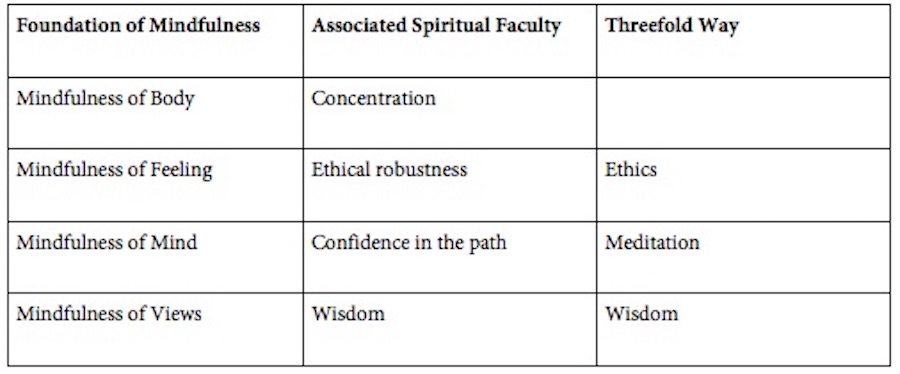
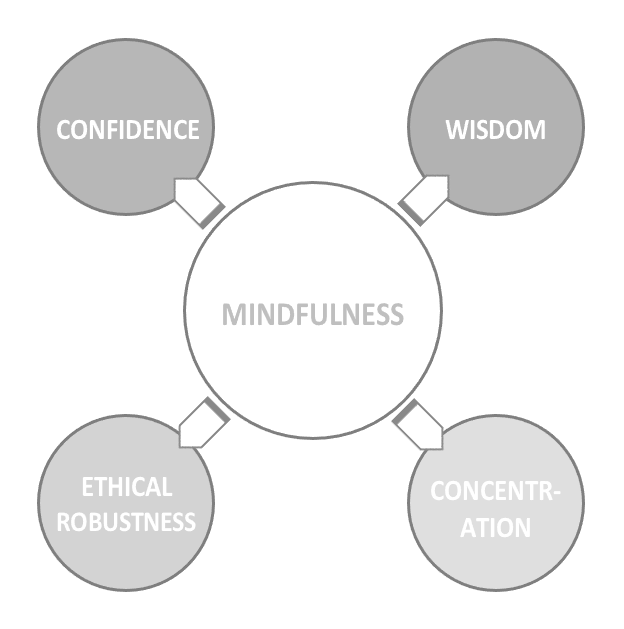

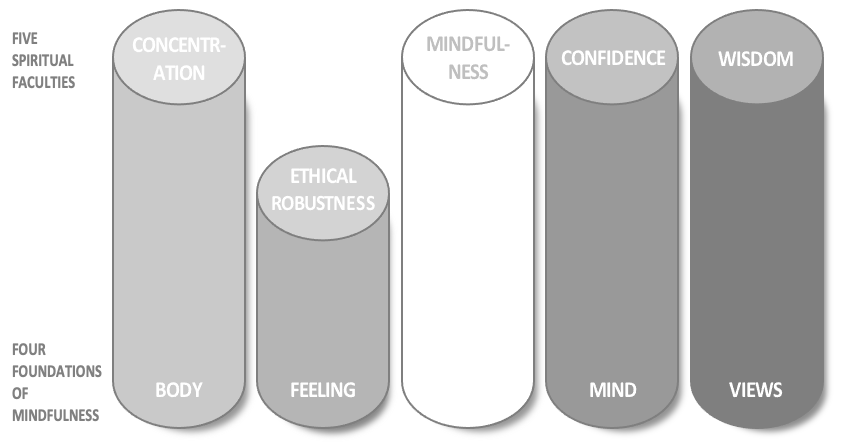



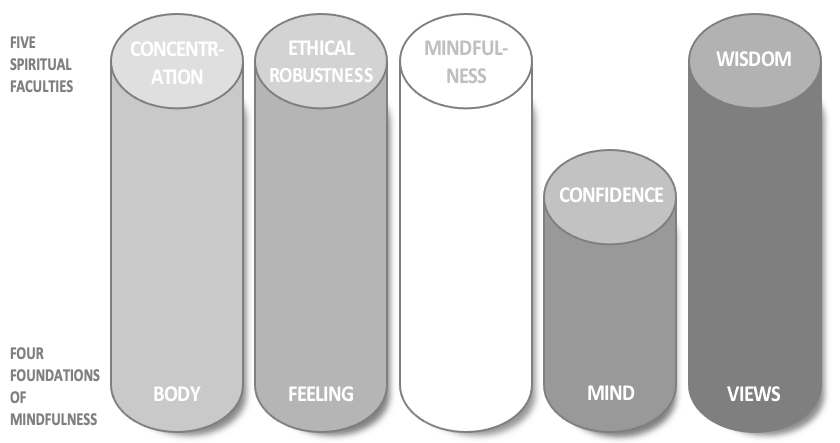

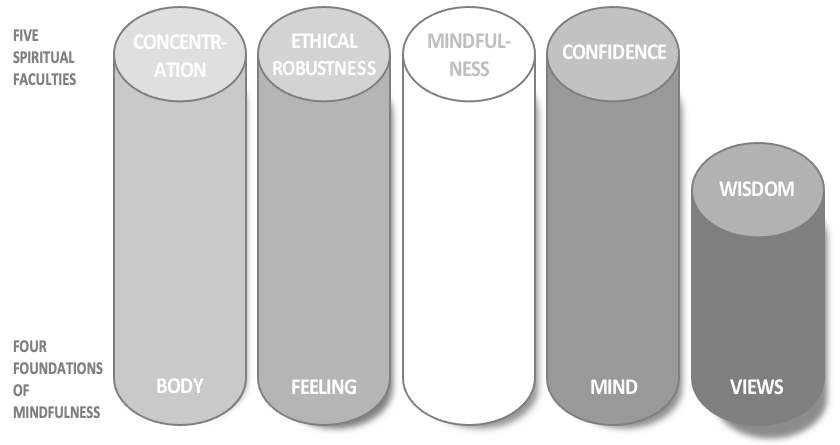





 Users Today : 5
Users Today : 5 Users Yesterday : 25
Users Yesterday : 25 This Month : 211
This Month : 211 Total Users : 17064
Total Users : 17064
